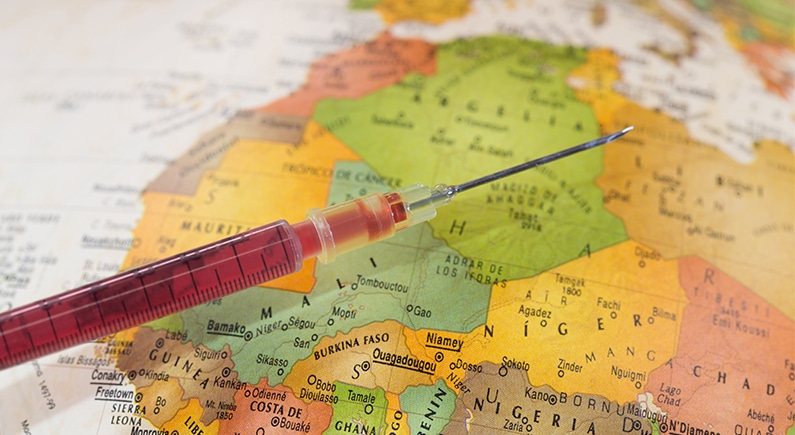
Michael Joe Cini
15th December 2022
MedTech in Africa: Closing The GAP
Despite being home to only about 3% of the global health workforce, Sub-Saharan Africa bears about one-quarter of the global disease burden. On average, there are 3 physicians to 10,000 population. This is increasingly declining in countries like Nigeria which is currently witnessing massive emigration of health workers. How does MedTech in Africa fare at the close of 2022?
The Journey and the Rise of MedTech in Africa
Innovators have recently pumped more funds into the healthcare sector, with an understanding of the market drivers, including the COVID-19 pandemic, population needs, consumer-centricity, data analytics and aggregation, and big tech involvement. This explains the explosive growth in health-tech start-ups in Africa.
According to Statista, African health-tech recorded impressive growth from 2015 to 2021. In 2020, over 40 health-tech start-ups received series A funding. These firms cover a range of health-related fields, such as drug procurement, genetic sequencing, and health literacy.
An example of Africa’s early start-up is Wisepill, a South African company established in 2007. It developed a storage container that reminds users via their mobile devices to take their medication and also alerts doctors or researchers when a pill is taken. Wisepill ended up improving the rate of medication adherence to more than 90%. On the other hand, Meditell, a Nigeria-based health-tech start-up, failed. It also aimed to improve medication compliance; it functions through a software that sends text messages to patients from the hospital, reminding them to take their medications. However, with several modifications to its product, it gradually deviated from its initial goal and eventually failed. Notwithstanding, the success story of Wisepill revealed the possibilities of an African Med-Tech firm scaling up from starting small, growing slowly, and responding to their clients. District Health Information Software (DHIS) began recording patient information on its platform in South Africa. As interest in the platform increased, its programmers worked to add to its features and improve its usability in different contexts. Currently, the platform has been adopted and is being used in 73 countries.
Despite seemingly insufficient resources, African health-tech entrepreneurs have impressively advanced and achieved unexpected feats. In the 2000s, Frontline SMS aimed to improve communication between community health workers and hospital staff. However, the founders found it difficult as internet was not yet widespread. They, having found a way around the infrastructural constraints, later developed a program to pass information through simple text-message technology, which could also be used to send images of blood samples taken with a camera phone, thus allowing diagnosing of patients without going to a clinic.
From this humble start, African health-tech firms have advanced beyond the constraints. The pandemic has also been helpful in the advancement of medical technology in Africa, as the response to COVID-19 spurred innovation and investment in the sector.
Recent years have witnessed promising projects being successfully established in African countries; an example is the pioneer telehealth company in Ghana, mPharma, which set to establish 100 virtual centres across Africa. Another forward step is the partnership between Digital Afrique Telecom (DAT) and Ever Medical Technologies. The partnership seeks to modernize Africa’s healthcare industry through technology and improve, facilitate, and disseminate digital medical solutions across the continent. The following years are expected to witness many more health tech companies’ evolution in Africa.
The African Medtech Situation
Most times when Africa comes to mind, we are forced to think about a people wrapped in underdevelopment and insufficient resources. This may not be far from the truth: while life expectancy continues to increase globally, most African countries are still lagging with their population’s life hanging at the mercy of communicable and non-communicable diseases.
Across Africa, countries constantly face remarkable disruptions in their medicine supply chains and last-mile health-service delivery, inadequacy in medicine data storage and analysis, and poor financing. Some barriers prevent equitable access to quality care and vital medicines, especially in remote areas. Inadequate policies and gaps in policy effectiveness, unavailability of health personnel with the required expertise, inadequate access to health equipment, poor community and user integration with the technology, and poor funding were part of the hurdles identified. Some of them persist even now. These seemingly underdeveloped healthcare systems have made obvious the need for radical innovative solutions.
The need is evident, and the response, to some extent, is satisfactory. Over the past few years, attempts have been made to improve healthcare in Africa. Stakeholders, decision-makers, and the WHO have cautiously joined forces to raise funds and improve Africa’s healthcare system, especially through technology.
In 2021, the continent witnessed about $4.77 billion investment in start-ups and 479 companies operating in the health sector received $379.6 million, compared to 2020 when 180 companies received $90 million. Of course, this is less than what’s needed to take the continent out of its struggles.
SiGMA Group flies to Africa, 2023
This January, SiGMA Group is breaking ground in Africa. Flying to the Green City in the Sun, delegates can expect to fully benefit from the show at Nairobi, Kenya. KOL-led panels and keynotes, premium networking opportunities and the latest features in frontier technology! Check out our website for more information.




